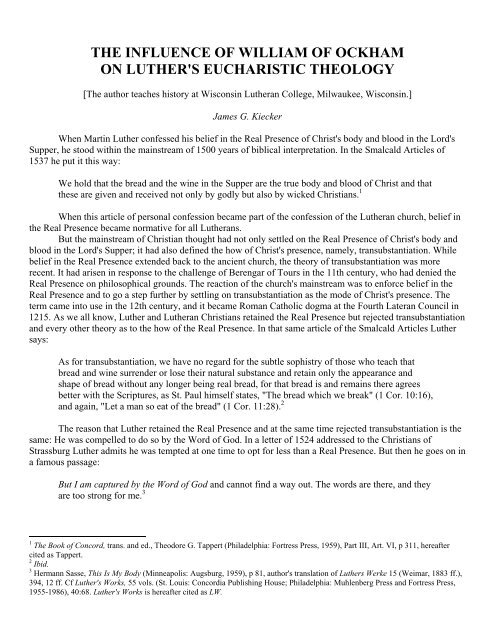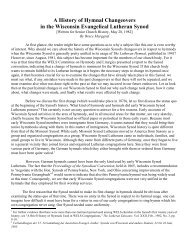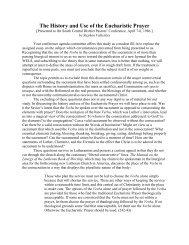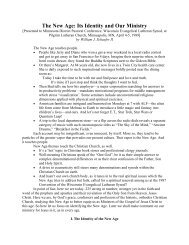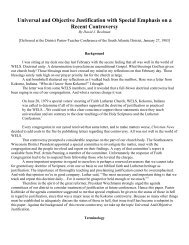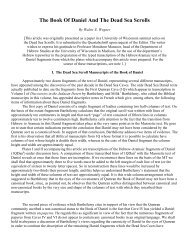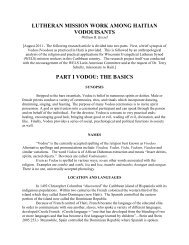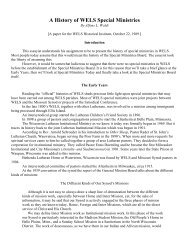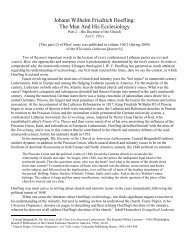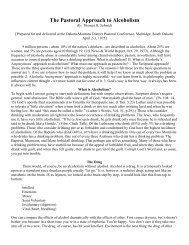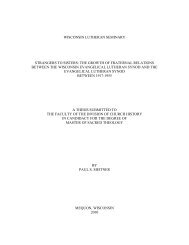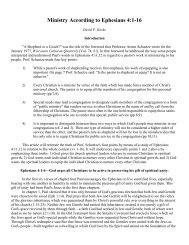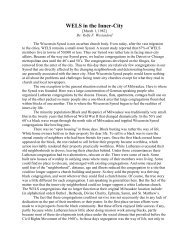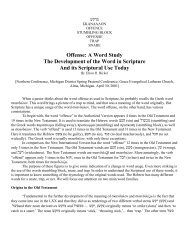the influence of william of ockham on luther's eucharistic theology
the influence of william of ockham on luther's eucharistic theology
the influence of william of ockham on luther's eucharistic theology
Create successful ePaper yourself
Turn your PDF publications into a flip-book with our unique Google optimized e-Paper software.
THE INFLUENCE OF WILLIAM OF OCKHAM<br />
ON LUTHER'S EUCHARISTIC THEOLOGY<br />
[The author teaches history at Wisc<strong>on</strong>sin Lu<str<strong>on</strong>g>the</str<strong>on</strong>g>ran College, Milwaukee, Wisc<strong>on</strong>sin.]<br />
James G. Kiecker<br />
When Martin Lu<str<strong>on</strong>g>the</str<strong>on</strong>g>r c<strong>on</strong>fessed his belief in <str<strong>on</strong>g>the</str<strong>on</strong>g> Real Presence <str<strong>on</strong>g>of</str<strong>on</strong>g> Christ's body and blood in <str<strong>on</strong>g>the</str<strong>on</strong>g> Lord's<br />
Supper, he stood within <str<strong>on</strong>g>the</str<strong>on</strong>g> mainstream <str<strong>on</strong>g>of</str<strong>on</strong>g> 1500 years <str<strong>on</strong>g>of</str<strong>on</strong>g> biblical interpretati<strong>on</strong>. In <str<strong>on</strong>g>the</str<strong>on</strong>g> Smalcald Articles <str<strong>on</strong>g>of</str<strong>on</strong>g><br />
1537 he put it this way:<br />
We hold that <str<strong>on</strong>g>the</str<strong>on</strong>g> bread and <str<strong>on</strong>g>the</str<strong>on</strong>g> wine in <str<strong>on</strong>g>the</str<strong>on</strong>g> Supper are <str<strong>on</strong>g>the</str<strong>on</strong>g> true body and blood <str<strong>on</strong>g>of</str<strong>on</strong>g> Christ and that<br />
<str<strong>on</strong>g>the</str<strong>on</strong>g>se are given and received not <strong>on</strong>ly by godly but also by wicked Christians. 1<br />
When this article <str<strong>on</strong>g>of</str<strong>on</strong>g> pers<strong>on</strong>al c<strong>on</strong>fessi<strong>on</strong> became part <str<strong>on</strong>g>of</str<strong>on</strong>g> <str<strong>on</strong>g>the</str<strong>on</strong>g> c<strong>on</strong>fessi<strong>on</strong> <str<strong>on</strong>g>of</str<strong>on</strong>g> <str<strong>on</strong>g>the</str<strong>on</strong>g> Lu<str<strong>on</strong>g>the</str<strong>on</strong>g>ran church, belief in<br />
<str<strong>on</strong>g>the</str<strong>on</strong>g> Real Presence became normative for all Lu<str<strong>on</strong>g>the</str<strong>on</strong>g>rans.<br />
But <str<strong>on</strong>g>the</str<strong>on</strong>g> mainstream <str<strong>on</strong>g>of</str<strong>on</strong>g> Christian thought had not <strong>on</strong>ly settled <strong>on</strong> <str<strong>on</strong>g>the</str<strong>on</strong>g> Real Presence <str<strong>on</strong>g>of</str<strong>on</strong>g> Christ's body and<br />
blood in <str<strong>on</strong>g>the</str<strong>on</strong>g> Lord's Supper; it had also defined <str<strong>on</strong>g>the</str<strong>on</strong>g> how <str<strong>on</strong>g>of</str<strong>on</strong>g> Christ's presence, namely, transubstantiati<strong>on</strong>. While<br />
belief in <str<strong>on</strong>g>the</str<strong>on</strong>g> Real Presence extended back to <str<strong>on</strong>g>the</str<strong>on</strong>g> ancient church, <str<strong>on</strong>g>the</str<strong>on</strong>g> <str<strong>on</strong>g>the</str<strong>on</strong>g>ory <str<strong>on</strong>g>of</str<strong>on</strong>g> transubstantiati<strong>on</strong> was more<br />
recent. It had arisen in resp<strong>on</strong>se to <str<strong>on</strong>g>the</str<strong>on</strong>g> challenge <str<strong>on</strong>g>of</str<strong>on</strong>g> Berengar <str<strong>on</strong>g>of</str<strong>on</strong>g> Tours in <str<strong>on</strong>g>the</str<strong>on</strong>g> 11th century, who had denied <str<strong>on</strong>g>the</str<strong>on</strong>g><br />
Real Presence <strong>on</strong> philosophical grounds. The reacti<strong>on</strong> <str<strong>on</strong>g>of</str<strong>on</strong>g> <str<strong>on</strong>g>the</str<strong>on</strong>g> church's mainstream was to enforce belief in <str<strong>on</strong>g>the</str<strong>on</strong>g><br />
Real Presence and to go a step fur<str<strong>on</strong>g>the</str<strong>on</strong>g>r by settling <strong>on</strong> transubstantiati<strong>on</strong> as <str<strong>on</strong>g>the</str<strong>on</strong>g> mode <str<strong>on</strong>g>of</str<strong>on</strong>g> Christ's presence. The<br />
term came into use in <str<strong>on</strong>g>the</str<strong>on</strong>g> 12th century, and it became Roman Catholic dogma at <str<strong>on</strong>g>the</str<strong>on</strong>g> Fourth Lateran Council in<br />
1215. As we all know, Lu<str<strong>on</strong>g>the</str<strong>on</strong>g>r and Lu<str<strong>on</strong>g>the</str<strong>on</strong>g>ran Christians retained <str<strong>on</strong>g>the</str<strong>on</strong>g> Real Presence but rejected transubstantiati<strong>on</strong><br />
and every o<str<strong>on</strong>g>the</str<strong>on</strong>g>r <str<strong>on</strong>g>the</str<strong>on</strong>g>ory as to <str<strong>on</strong>g>the</str<strong>on</strong>g> how <str<strong>on</strong>g>of</str<strong>on</strong>g> <str<strong>on</strong>g>the</str<strong>on</strong>g> Real Presence. In that same article <str<strong>on</strong>g>of</str<strong>on</strong>g> <str<strong>on</strong>g>the</str<strong>on</strong>g> Smalcald Articles Lu<str<strong>on</strong>g>the</str<strong>on</strong>g>r<br />
says:<br />
As for transubstantiati<strong>on</strong>, we have no regard for <str<strong>on</strong>g>the</str<strong>on</strong>g> subtle sophistry <str<strong>on</strong>g>of</str<strong>on</strong>g> those who teach that<br />
bread and wine surrender or lose <str<strong>on</strong>g>the</str<strong>on</strong>g>ir natural substance and retain <strong>on</strong>ly <str<strong>on</strong>g>the</str<strong>on</strong>g> appearance and<br />
shape <str<strong>on</strong>g>of</str<strong>on</strong>g> bread without any l<strong>on</strong>ger being real bread, for that bread is and remains <str<strong>on</strong>g>the</str<strong>on</strong>g>re agrees<br />
better with <str<strong>on</strong>g>the</str<strong>on</strong>g> Scriptures, as St. Paul himself states, "The bread which we break" (1 Cor. 10:16),<br />
and again, "Let a man so eat <str<strong>on</strong>g>of</str<strong>on</strong>g> <str<strong>on</strong>g>the</str<strong>on</strong>g> bread" (1 Cor. 11:28). 2<br />
The reas<strong>on</strong> that Lu<str<strong>on</strong>g>the</str<strong>on</strong>g>r retained <str<strong>on</strong>g>the</str<strong>on</strong>g> Real Presence and at <str<strong>on</strong>g>the</str<strong>on</strong>g> same time rejected transubstantiati<strong>on</strong> is <str<strong>on</strong>g>the</str<strong>on</strong>g><br />
same: He was compelled to do so by <str<strong>on</strong>g>the</str<strong>on</strong>g> Word <str<strong>on</strong>g>of</str<strong>on</strong>g> God. In a letter <str<strong>on</strong>g>of</str<strong>on</strong>g> 1524 addressed to <str<strong>on</strong>g>the</str<strong>on</strong>g> Christians <str<strong>on</strong>g>of</str<strong>on</strong>g><br />
Strassburg Lu<str<strong>on</strong>g>the</str<strong>on</strong>g>r admits he was tempted at <strong>on</strong>e time to opt for less than a Real Presence. But <str<strong>on</strong>g>the</str<strong>on</strong>g>n he goes <strong>on</strong> in<br />
a famous passage:<br />
But I am captured by <str<strong>on</strong>g>the</str<strong>on</strong>g> Word <str<strong>on</strong>g>of</str<strong>on</strong>g> God and cannot find a way out. The words are <str<strong>on</strong>g>the</str<strong>on</strong>g>re, and <str<strong>on</strong>g>the</str<strong>on</strong>g>y<br />
are too str<strong>on</strong>g for me. 3<br />
1 The Book <str<strong>on</strong>g>of</str<strong>on</strong>g> C<strong>on</strong>cord, trans. and ed., Theodore G. Tappert (Philadelphia: Fortress Press, 1959), Part III, Art. VI, p 311, hereafter<br />
cited as Tappert.<br />
2 Ibid.<br />
3 Hermann Sasse, This Is My Body (Minneapolis: Augsburg, 1959), p 81, author's translati<strong>on</strong> <str<strong>on</strong>g>of</str<strong>on</strong>g> Lu<str<strong>on</strong>g>the</str<strong>on</strong>g>rs Werke 15 (Weimar, 1883 ff.),<br />
394, 12 ff. Cf Lu<str<strong>on</strong>g>the</str<strong>on</strong>g>r's Works, 55 vols. (St. Louis: C<strong>on</strong>cordia Publishing House; Philadelphia: Muhlenberg Press and Fortress Press,<br />
1955-1986), 40:68. Lu<str<strong>on</strong>g>the</str<strong>on</strong>g>r's Works is hereafter cited as LW.
Commenting <strong>on</strong> <str<strong>on</strong>g>the</str<strong>on</strong>g>se words, Hermann Sasse says that "it was <str<strong>on</strong>g>the</str<strong>on</strong>g> Word <str<strong>on</strong>g>of</str<strong>on</strong>g> God and nothing else that made him<br />
a fervent believer in <str<strong>on</strong>g>the</str<strong>on</strong>g> Real Presence." 4 Later Sasse writes: "We have no utterance <str<strong>on</strong>g>of</str<strong>on</strong>g> Lu<str<strong>on</strong>g>the</str<strong>on</strong>g>r's in which he<br />
expresses any doubt c<strong>on</strong>cerning <str<strong>on</strong>g>the</str<strong>on</strong>g> belief that <str<strong>on</strong>g>the</str<strong>on</strong>g> body and blood <str<strong>on</strong>g>of</str<strong>on</strong>g> Christ are truly present in <str<strong>on</strong>g>the</str<strong>on</strong>g> Lord's<br />
Supper." 5 The Word had compelled Lu<str<strong>on</strong>g>the</str<strong>on</strong>g>r to acknowledge <str<strong>on</strong>g>the</str<strong>on</strong>g> Real Presence.<br />
Likewise, it was <str<strong>on</strong>g>the</str<strong>on</strong>g> Word <str<strong>on</strong>g>of</str<strong>on</strong>g> God—more accurately, <str<strong>on</strong>g>the</str<strong>on</strong>g> lack <str<strong>on</strong>g>of</str<strong>on</strong>g> a specific Word—which prompted<br />
Lu<str<strong>on</strong>g>the</str<strong>on</strong>g>r to drop <str<strong>on</strong>g>the</str<strong>on</strong>g> prevailing <str<strong>on</strong>g>the</str<strong>on</strong>g>ory <str<strong>on</strong>g>of</str<strong>on</strong>g> transubstantiati<strong>on</strong>. As he read over <str<strong>on</strong>g>the</str<strong>on</strong>g> <strong>eucharistic</strong> texts <str<strong>on</strong>g>of</str<strong>on</strong>g> Scripture he<br />
found nothing to warrant transubstantiati<strong>on</strong>. Lu<str<strong>on</strong>g>the</str<strong>on</strong>g>r's first doubt about transubstantiati<strong>on</strong> is c<strong>on</strong>tained in his<br />
treatise <strong>on</strong> The Blessed Sacrament <str<strong>on</strong>g>of</str<strong>on</strong>g> <str<strong>on</strong>g>the</str<strong>on</strong>g> Holy and True Body <str<strong>on</strong>g>of</str<strong>on</strong>g> Christ, and <str<strong>on</strong>g>the</str<strong>on</strong>g> Bro<str<strong>on</strong>g>the</str<strong>on</strong>g>rhoods <str<strong>on</strong>g>of</str<strong>on</strong>g> 1519. He<br />
writes:<br />
Christ . . . gave his true natural flesh in <str<strong>on</strong>g>the</str<strong>on</strong>g> bread, and his natural true blood in <str<strong>on</strong>g>the</str<strong>on</strong>g> wine, that he<br />
might give a really perfect sacrament or sign. For just as <str<strong>on</strong>g>the</str<strong>on</strong>g> bread is changed into his true<br />
natural body and <str<strong>on</strong>g>the</str<strong>on</strong>g> wine into his natural true blood, so truly are we also drawn and changed<br />
into <str<strong>on</strong>g>the</str<strong>on</strong>g> spiritual body . . . . 6<br />
The word translated changed is vorwandelt in German, 7 a term associated with transubstantiati<strong>on</strong>. But it is<br />
doubtful whe<str<strong>on</strong>g>the</str<strong>on</strong>g>r Lu<str<strong>on</strong>g>the</str<strong>on</strong>g>r here wants changed so understood, a fact brought out by <str<strong>on</strong>g>the</str<strong>on</strong>g>se subsequent words:<br />
There are those who practice <str<strong>on</strong>g>the</str<strong>on</strong>g>ir arts and subtleties by trying [to fathom] what becomes <str<strong>on</strong>g>of</str<strong>on</strong>g> <str<strong>on</strong>g>the</str<strong>on</strong>g><br />
bread when it is changed into Christ's flesh and <str<strong>on</strong>g>of</str<strong>on</strong>g> <str<strong>on</strong>g>the</str<strong>on</strong>g> wine when it is changed into his blood and<br />
how <str<strong>on</strong>g>the</str<strong>on</strong>g> whole Christ, his flesh and blood, can be encompassed in so small a porti<strong>on</strong> <str<strong>on</strong>g>of</str<strong>on</strong>g> bread and<br />
wine. It does not matterif you do not see it. It is enough to know that it is a divine sign in which<br />
Christ's flesh and blood are truly present. The how and <str<strong>on</strong>g>the</str<strong>on</strong>g> where, we leave to him. 8<br />
It seems, <str<strong>on</strong>g>the</str<strong>on</strong>g>n, by <str<strong>on</strong>g>the</str<strong>on</strong>g> word changed Lu<str<strong>on</strong>g>the</str<strong>on</strong>g>r intended no more than what he later <strong>on</strong> intended by in, with<br />
and under, a simple affirmati<strong>on</strong> that <str<strong>on</strong>g>the</str<strong>on</strong>g> Lord's body and blood were really and truly present in <str<strong>on</strong>g>the</str<strong>on</strong>g> Sacrament.<br />
God's Word prompted Lu<str<strong>on</strong>g>the</str<strong>on</strong>g>r to c<strong>on</strong>fess <str<strong>on</strong>g>the</str<strong>on</strong>g> Real Presence. The lack <str<strong>on</strong>g>of</str<strong>on</strong>g> a specific Word prompted him<br />
finally to deny transubstantiati<strong>on</strong>. Yet Lu<str<strong>on</strong>g>the</str<strong>on</strong>g>r himself acknowledged a particular <str<strong>on</strong>g>influence</str<strong>on</strong>g> <strong>on</strong> his c<strong>on</strong>clusi<strong>on</strong>. In<br />
his ground-breaking The Babyl<strong>on</strong>ian Captivity <str<strong>on</strong>g>of</str<strong>on</strong>g> <str<strong>on</strong>g>the</str<strong>on</strong>g> Church <str<strong>on</strong>g>of</str<strong>on</strong>g> 1520, in <str<strong>on</strong>g>the</str<strong>on</strong>g> secti<strong>on</strong> dealing with<br />
transubstantiati<strong>on</strong>, Lu<str<strong>on</strong>g>the</str<strong>on</strong>g>r recalled something he had <strong>on</strong>ce read:<br />
Some time ago, when I was drinking in scholastic <str<strong>on</strong>g>the</str<strong>on</strong>g>ology, <str<strong>on</strong>g>the</str<strong>on</strong>g> learned Cardinal <str<strong>on</strong>g>of</str<strong>on</strong>g> Cambrai<br />
gave me food for thought in his comment <strong>on</strong> <str<strong>on</strong>g>the</str<strong>on</strong>g> fourth book <str<strong>on</strong>g>of</str<strong>on</strong>g> <str<strong>on</strong>g>the</str<strong>on</strong>g> Sentences. He argues with<br />
great acumen that to hold that real bread and real wine, and not merely <str<strong>on</strong>g>the</str<strong>on</strong>g>ir accidents, are<br />
present <strong>on</strong> <str<strong>on</strong>g>the</str<strong>on</strong>g> altar, would be much more probable and require fewer superfluous miracles-if<br />
<strong>on</strong>ly <str<strong>on</strong>g>the</str<strong>on</strong>g> church had not decreed o<str<strong>on</strong>g>the</str<strong>on</strong>g>rwise. 9<br />
Who was this "learned Cardinal?" He was Pierre d'Ailly (1350-1420), who was chairman <str<strong>on</strong>g>of</str<strong>on</strong>g> that sessi<strong>on</strong><br />
<str<strong>on</strong>g>of</str<strong>on</strong>g> <str<strong>on</strong>g>the</str<strong>on</strong>g> Council <str<strong>on</strong>g>of</str<strong>on</strong>g> C<strong>on</strong>stance which c<strong>on</strong>demned John Huss in 1415. More important, d'Ailly followed closely <str<strong>on</strong>g>the</str<strong>on</strong>g><br />
thinking <str<strong>on</strong>g>of</str<strong>on</strong>g> William <str<strong>on</strong>g>of</str<strong>on</strong>g> Ockham (ca. 1285-1349), who had expressed reservati<strong>on</strong>s about transubstantiati<strong>on</strong>.<br />
4 Ibid.<br />
5 Ibid, p 82.<br />
6 LW 35:59, and fn. 27<br />
7 Vorwandelt is <str<strong>on</strong>g>the</str<strong>on</strong>g> spelling in WA 2:749 in place <str<strong>on</strong>g>of</str<strong>on</strong>g> <str<strong>on</strong>g>the</str<strong>on</strong>g> modern verwandelt (ed.).<br />
8 Ibid, pp 60, 61.<br />
9 LW 36:28,29, and footnotes. Incidentally, <str<strong>on</strong>g>the</str<strong>on</strong>g> principle which d'Ailly makes use <str<strong>on</strong>g>of</str<strong>on</strong>g> here—an explanati<strong>on</strong> involving fewer miracles is<br />
preferable to <strong>on</strong>e requiring more—is a variati<strong>on</strong> <str<strong>on</strong>g>of</str<strong>on</strong>g> what has come down to us as "Ockham's Razor."
Since <str<strong>on</strong>g>the</str<strong>on</strong>g> works <str<strong>on</strong>g>of</str<strong>on</strong>g> d'Ailly are not generally available, it is impossible to determine whe<str<strong>on</strong>g>the</str<strong>on</strong>g>r Lu<str<strong>on</strong>g>the</str<strong>on</strong>g>r<br />
understood d'Ailly correctly. 10 But assuming Lu<str<strong>on</strong>g>the</str<strong>on</strong>g>r did understand d'Ailly correctly, a corresp<strong>on</strong>dence can be<br />
shown between <str<strong>on</strong>g>the</str<strong>on</strong>g> thought <str<strong>on</strong>g>of</str<strong>on</strong>g> d'Ailly and that <str<strong>on</strong>g>of</str<strong>on</strong>g> Ockham. In his treatise De Sacramento Altaris, in a secti<strong>on</strong><br />
dealing with <str<strong>on</strong>g>the</str<strong>on</strong>g> mode <str<strong>on</strong>g>of</str<strong>on</strong>g> Christ's presence in <str<strong>on</strong>g>the</str<strong>on</strong>g> Lord's Supper, Ockham refers to and agrees with certain<br />
doctors who posit that<br />
<str<strong>on</strong>g>the</str<strong>on</strong>g>re is no c<strong>on</strong>tradicti<strong>on</strong> involved in <str<strong>on</strong>g>the</str<strong>on</strong>g> statement that through divine power <str<strong>on</strong>g>the</str<strong>on</strong>g> substance <str<strong>on</strong>g>of</str<strong>on</strong>g> <str<strong>on</strong>g>the</str<strong>on</strong>g><br />
bread may be able to remain with <str<strong>on</strong>g>the</str<strong>on</strong>g> body <str<strong>on</strong>g>of</str<strong>on</strong>g> Christ. And [this statement] seems to me more<br />
probable and more in accord with <str<strong>on</strong>g>the</str<strong>on</strong>g>ology, because it ra<str<strong>on</strong>g>the</str<strong>on</strong>g>r exalts <str<strong>on</strong>g>the</str<strong>on</strong>g> omnipotence <str<strong>on</strong>g>of</str<strong>on</strong>g> God by<br />
detracting nothing from it, nor does it plainly and expressly imply a c<strong>on</strong>tradicti<strong>on</strong>. 11<br />
Then, having already quoted <str<strong>on</strong>g>the</str<strong>on</strong>g> church's teaching <strong>on</strong> transubstantiati<strong>on</strong>, Ockham refrains "for <str<strong>on</strong>g>the</str<strong>on</strong>g><br />
present" from a fur<str<strong>on</strong>g>the</str<strong>on</strong>g>r discussi<strong>on</strong> <str<strong>on</strong>g>of</str<strong>on</strong>g> <str<strong>on</strong>g>the</str<strong>on</strong>g> issue. What d'Ailly and before him Ockham were arguing for was<br />
basically <str<strong>on</strong>g>the</str<strong>on</strong>g> Real Presence without transubstantiati<strong>on</strong>, Lu<str<strong>on</strong>g>the</str<strong>on</strong>g>r's mature positi<strong>on</strong>. Of course, Ockham and d'Ailly<br />
in <str<strong>on</strong>g>the</str<strong>on</strong>g> 14th and 15th centuries still felt obliged to bow to <str<strong>on</strong>g>the</str<strong>on</strong>g> collective wisdom <str<strong>on</strong>g>of</str<strong>on</strong>g> Mo<str<strong>on</strong>g>the</str<strong>on</strong>g>r Church, which had<br />
arrived at a different c<strong>on</strong>clusi<strong>on</strong>. Scarcely <strong>on</strong>e hundred years later Lu<str<strong>on</strong>g>the</str<strong>on</strong>g>r did not feel <str<strong>on</strong>g>the</str<strong>on</strong>g> same necessity. His<br />
remarks <strong>on</strong> d'Ailly c<strong>on</strong>tinue:<br />
When I learned later what church it was that had decreed this, namely, <str<strong>on</strong>g>the</str<strong>on</strong>g> Thomistic—that is,<br />
<str<strong>on</strong>g>the</str<strong>on</strong>g> Aristotelian church—I grew bolder, and after floating in a sea <str<strong>on</strong>g>of</str<strong>on</strong>g> doubt, I at last found rest for<br />
my c<strong>on</strong>science in <str<strong>on</strong>g>the</str<strong>on</strong>g> above view, namely, that it is real bread and real wine, in which Christ's<br />
real flesh and real blood are present in no o<str<strong>on</strong>g>the</str<strong>on</strong>g>r way and to no less a degree than <str<strong>on</strong>g>the</str<strong>on</strong>g> o<str<strong>on</strong>g>the</str<strong>on</strong>g>rs assert<br />
<str<strong>on</strong>g>the</str<strong>on</strong>g>m to be under <str<strong>on</strong>g>the</str<strong>on</strong>g>ir accidents. I reached this c<strong>on</strong>clusi<strong>on</strong> because I saw that <str<strong>on</strong>g>the</str<strong>on</strong>g> opini<strong>on</strong>s <str<strong>on</strong>g>of</str<strong>on</strong>g> <str<strong>on</strong>g>the</str<strong>on</strong>g><br />
Thomists, whe<str<strong>on</strong>g>the</str<strong>on</strong>g>r approved by pope or by council, remain <strong>on</strong>ly opini<strong>on</strong>s, and would not become<br />
articles <str<strong>on</strong>g>of</str<strong>on</strong>g> faith even if an angel from heaven were to decree o<str<strong>on</strong>g>the</str<strong>on</strong>g>rwise [Gal. 1:8]. For what is<br />
asserted without Scriptures or proven revelati<strong>on</strong> may be held as an opini<strong>on</strong>, but need not be believed.<br />
12<br />
For <str<strong>on</strong>g>the</str<strong>on</strong>g> sake <str<strong>on</strong>g>of</str<strong>on</strong>g> completeness it should be pointed out that Lu<str<strong>on</strong>g>the</str<strong>on</strong>g>r at this time (1520), while pers<strong>on</strong>ally<br />
denying transubstantiati<strong>on</strong>, was still willing to let it stand as an opini<strong>on</strong> <str<strong>on</strong>g>of</str<strong>on</strong>g> o<str<strong>on</strong>g>the</str<strong>on</strong>g>rs. After arguing fervently for <str<strong>on</strong>g>the</str<strong>on</strong>g><br />
Real Presence minus transubstantiati<strong>on</strong>, citing approvingly <str<strong>on</strong>g>the</str<strong>on</strong>g> comm<strong>on</strong> people who "believe with a simple faith<br />
that Christ's body and blood are truly c<strong>on</strong>tained <str<strong>on</strong>g>the</str<strong>on</strong>g>re," 13 he c<strong>on</strong>cludes:<br />
At <str<strong>on</strong>g>the</str<strong>on</strong>g> same time, I permit o<str<strong>on</strong>g>the</str<strong>on</strong>g>r men to follow <str<strong>on</strong>g>the</str<strong>on</strong>g> o<str<strong>on</strong>g>the</str<strong>on</strong>g>r opini<strong>on</strong>, which is laid down in <str<strong>on</strong>g>the</str<strong>on</strong>g><br />
decree, Firmiter, <strong>on</strong>ly let <str<strong>on</strong>g>the</str<strong>on</strong>g>m not press us to accept <str<strong>on</strong>g>the</str<strong>on</strong>g>ir opini<strong>on</strong>s as articles <str<strong>on</strong>g>of</str<strong>on</strong>g> faith (as I have<br />
said above). 14<br />
Until 1524 Lu<str<strong>on</strong>g>the</str<strong>on</strong>g>r's opp<strong>on</strong>ents were mainly <str<strong>on</strong>g>the</str<strong>on</strong>g> papists, but after that year he was drawn into battle with<br />
o<str<strong>on</strong>g>the</str<strong>on</strong>g>r reformers as well. In <str<strong>on</strong>g>the</str<strong>on</strong>g> case <str<strong>on</strong>g>of</str<strong>on</strong>g> <str<strong>on</strong>g>the</str<strong>on</strong>g> former <str<strong>on</strong>g>the</str<strong>on</strong>g> point <str<strong>on</strong>g>of</str<strong>on</strong>g> c<strong>on</strong>tenti<strong>on</strong> was Lu<str<strong>on</strong>g>the</str<strong>on</strong>g>r's denial <str<strong>on</strong>g>of</str<strong>on</strong>g><br />
transubstantiati<strong>on</strong>. With <str<strong>on</strong>g>the</str<strong>on</strong>g> latter <str<strong>on</strong>g>the</str<strong>on</strong>g> struggle centered <strong>on</strong> <str<strong>on</strong>g>the</str<strong>on</strong>g> Real Presence itself.<br />
10 The editors <str<strong>on</strong>g>of</str<strong>on</strong>g> LW suggest a source, LW 36:28, fn. 59. Some <str<strong>on</strong>g>of</str<strong>on</strong>g> d'Ailly's works were published by his friend Jean Gers<strong>on</strong><br />
(1363-1429) in Gers<strong>on</strong>'s Opera Omnia, ed. L. E. Dupin (Antwerp, 1706), 5 vole. But <str<strong>on</strong>g>the</str<strong>on</strong>g> present passage is not am<strong>on</strong>g <str<strong>on</strong>g>the</str<strong>on</strong>g>se works.<br />
11 T. Bruce Birch, The De Sacramento Altaris <str<strong>on</strong>g>of</str<strong>on</strong>g> William <str<strong>on</strong>g>of</str<strong>on</strong>g> Ockhdm (Burlingt<strong>on</strong>, Iowa: The Lu<str<strong>on</strong>g>the</str<strong>on</strong>g>ran Literary Board, 1930), p 187.<br />
Ockham attributes his thought to "<str<strong>on</strong>g>the</str<strong>on</strong>g> subtle doctor," i.e., John Duns Scotus (ca.1265-1308).<br />
12 LW 36:29.<br />
13 lbid. p 32.<br />
14 lbid, p 35. Firmiter refers to <str<strong>on</strong>g>the</str<strong>on</strong>g> decree <str<strong>on</strong>g>of</str<strong>on</strong>g> Innocent III at <str<strong>on</strong>g>the</str<strong>on</strong>g> Fourth Lateran Council: "There is <strong>on</strong>e universal church <str<strong>on</strong>g>of</str<strong>on</strong>g> all believers,<br />
outside <str<strong>on</strong>g>of</str<strong>on</strong>g> which no <strong>on</strong>e at all is saved; in which He is both priest and sacrifice, whose body and blood are truly c<strong>on</strong>tained in <str<strong>on</strong>g>the</str<strong>on</strong>g><br />
sacrament <str<strong>on</strong>g>of</str<strong>on</strong>g> <str<strong>on</strong>g>the</str<strong>on</strong>g> altar under <str<strong>on</strong>g>the</str<strong>on</strong>g> species <str<strong>on</strong>g>of</str<strong>on</strong>g> bread and wine, when <str<strong>on</strong>g>the</str<strong>on</strong>g> bread is transubstantiated by divine power into <str<strong>on</strong>g>the</str<strong>on</strong>g> body <str<strong>on</strong>g>of</str<strong>on</strong>g> Christ<br />
and <str<strong>on</strong>g>the</str<strong>on</strong>g> wine into <str<strong>on</strong>g>the</str<strong>on</strong>g> blood." See Birch, p 185.
The challenge to <str<strong>on</strong>g>the</str<strong>on</strong>g> Real Presence, which emanated from Karlstadt, Bucer, Oecolampadius, Zwingli<br />
and many lesser lights, took a variety <str<strong>on</strong>g>of</str<strong>on</strong>g> forms, more than we can be c<strong>on</strong>cerned about here. But repeatedly<br />
Lu<str<strong>on</strong>g>the</str<strong>on</strong>g>r's opp<strong>on</strong>ents made use <str<strong>on</strong>g>of</str<strong>on</strong>g> <str<strong>on</strong>g>the</str<strong>on</strong>g> argument from Christ's ascensi<strong>on</strong>: If Christ has ascended to <str<strong>on</strong>g>the</str<strong>on</strong>g> right hand<br />
<str<strong>on</strong>g>of</str<strong>on</strong>g> God, <str<strong>on</strong>g>the</str<strong>on</strong>g>n how can he also be <strong>on</strong> earth in <str<strong>on</strong>g>the</str<strong>on</strong>g> bread and wine <str<strong>on</strong>g>of</str<strong>on</strong>g> his Supper? For Lu<str<strong>on</strong>g>the</str<strong>on</strong>g>r's opp<strong>on</strong>ents, <str<strong>on</strong>g>the</str<strong>on</strong>g><br />
correct understanding <str<strong>on</strong>g>of</str<strong>on</strong>g> <str<strong>on</strong>g>the</str<strong>on</strong>g> Lord's Supper seemed a simple. matter <str<strong>on</strong>g>of</str<strong>on</strong>g> letting Scripture interpret Scripture.<br />
Jesus' statement, "This is my body," was, <str<strong>on</strong>g>the</str<strong>on</strong>g>y said, literally unintelligible. Fortunately, it did not have to be<br />
taken literally. Scripture informs us that Jesus left this earth, making his presence in <str<strong>on</strong>g>the</str<strong>on</strong>g> bread and wine<br />
obviously impossible. Therefore, Scripture itself indicates that Jesus' words are not to be understood literally—<br />
spiritually or figuratively perhaps—but not literally, <str<strong>on</strong>g>the</str<strong>on</strong>g>y maintained.<br />
Lu<str<strong>on</strong>g>the</str<strong>on</strong>g>r was not impressed with this use <str<strong>on</strong>g>of</str<strong>on</strong>g> Scripture to interpret Scripture. Instead, he accused his<br />
opp<strong>on</strong>ents <str<strong>on</strong>g>of</str<strong>on</strong>g> rati<strong>on</strong>alism. In 1527, in a treatise That These Words <str<strong>on</strong>g>of</str<strong>on</strong>g> Christ, "This is My Body" Etc., Still Stand<br />
Firm Against <str<strong>on</strong>g>the</str<strong>on</strong>g> Fanatics, he rails against Oecolampadius:<br />
And again:<br />
This is <str<strong>on</strong>g>the</str<strong>on</strong>g> rancor and hatred <str<strong>on</strong>g>of</str<strong>on</strong>g> natural reas<strong>on</strong>, which wants nothing to do with this article and<br />
<str<strong>on</strong>g>the</str<strong>on</strong>g>refore spits and vomits against it, and <str<strong>on</strong>g>the</str<strong>on</strong>g>n tries to wrap itself in Scripture so that it may avoid<br />
being recognized. Not a single article <str<strong>on</strong>g>of</str<strong>on</strong>g> faith would remain if I followed <str<strong>on</strong>g>the</str<strong>on</strong>g> rancor <str<strong>on</strong>g>of</str<strong>on</strong>g> reas<strong>on</strong>. 15<br />
With this rancor, however, my dear fanatics prepare <str<strong>on</strong>g>the</str<strong>on</strong>g> way for <str<strong>on</strong>g>the</str<strong>on</strong>g> virtual denial <str<strong>on</strong>g>of</str<strong>on</strong>g> Christ, God,<br />
and everything. In part, already, <str<strong>on</strong>g>the</str<strong>on</strong>g>y have made a start at believing nothing at all. They follow<br />
<str<strong>on</strong>g>the</str<strong>on</strong>g> fancy <str<strong>on</strong>g>of</str<strong>on</strong>g> reas<strong>on</strong>, which <str<strong>on</strong>g>the</str<strong>on</strong>g>y expect to lead <str<strong>on</strong>g>the</str<strong>on</strong>g>m aright. 16<br />
In Lu<str<strong>on</strong>g>the</str<strong>on</strong>g>r's view his opp<strong>on</strong>ents had come across a phrase, "This is my body," which <strong>on</strong> its face was<br />
unreas<strong>on</strong>able. Their reacti<strong>on</strong> had been to find a reas<strong>on</strong>able soluti<strong>on</strong>. Lu<str<strong>on</strong>g>the</str<strong>on</strong>g>r would have n<strong>on</strong>e <str<strong>on</strong>g>of</str<strong>on</strong>g> it.<br />
In meeting his opp<strong>on</strong>ents' challenge to <str<strong>on</strong>g>the</str<strong>on</strong>g> Real Presence Lu<str<strong>on</strong>g>the</str<strong>on</strong>g>r again fell back up<strong>on</strong> <str<strong>on</strong>g>the</str<strong>on</strong>g> plain Word <str<strong>on</strong>g>of</str<strong>on</strong>g><br />
Scripture. How did he know that Christ's body and blood were really in his Supper? Answer: Christ said so. No<br />
o<str<strong>on</strong>g>the</str<strong>on</strong>g>r pro<str<strong>on</strong>g>of</str<strong>on</strong>g>, no o<str<strong>on</strong>g>the</str<strong>on</strong>g>r Scripture to interpret Scripture was necessary:<br />
Now do you demand Scripture from us, dear fanatics? Here it is: "Take, eat, this is my body."<br />
Torment yourselves for now with this text; later you shall have more. 17<br />
But what about <str<strong>on</strong>g>the</str<strong>on</strong>g> article that Christ sits at <str<strong>on</strong>g>the</str<strong>on</strong>g> right hand <str<strong>on</strong>g>of</str<strong>on</strong>g> God in heaven? Would that not indicate<br />
that Christ had left this earth and could not be in <str<strong>on</strong>g>the</str<strong>on</strong>g> Sacrament? Lu<str<strong>on</strong>g>the</str<strong>on</strong>g>r countered:<br />
Take notice and listen to us. Christ's body is at <str<strong>on</strong>g>the</str<strong>on</strong>g> right hand <str<strong>on</strong>g>of</str<strong>on</strong>g> God; that is granted. The right<br />
hand <str<strong>on</strong>g>of</str<strong>on</strong>g> God, however, is everywhere....Therefore it surely is present also in <str<strong>on</strong>g>the</str<strong>on</strong>g> bread and wine<br />
at table. Now where <str<strong>on</strong>g>the</str<strong>on</strong>g> right hand <str<strong>on</strong>g>of</str<strong>on</strong>g> God is, <str<strong>on</strong>g>the</str<strong>on</strong>g>re Christ's body and blood must be, for <str<strong>on</strong>g>the</str<strong>on</strong>g> right<br />
hand <str<strong>on</strong>g>of</str<strong>on</strong>g> God is not divisible into many parts but a single, simple entity. 18<br />
"The right hand <str<strong>on</strong>g>of</str<strong>on</strong>g> God is everywhere"—we can hardly appreciate <str<strong>on</strong>g>the</str<strong>on</strong>g> impact <str<strong>on</strong>g>of</str<strong>on</strong>g> this insight anymore<br />
today. It marked <str<strong>on</strong>g>the</str<strong>on</strong>g> end <str<strong>on</strong>g>of</str<strong>on</strong>g> <str<strong>on</strong>g>the</str<strong>on</strong>g> medieval spatial c<strong>on</strong>cept <str<strong>on</strong>g>of</str<strong>on</strong>g> heaven. 19 God's right hand was everywhere, and if<br />
Christ had g<strong>on</strong>e to his Fa<str<strong>on</strong>g>the</str<strong>on</strong>g>r's right hand, <str<strong>on</strong>g>the</str<strong>on</strong>g>n his body and blood were everywhere too, even in <str<strong>on</strong>g>the</str<strong>on</strong>g> bread and<br />
wine <str<strong>on</strong>g>of</str<strong>on</strong>g> his Supper.<br />
15 LW 37:53.<br />
16 LW 37:53.<br />
17 Ibid, p 50.<br />
18 lbid, pp 63,64.<br />
19 Sasse, p 159.
Lu<str<strong>on</strong>g>the</str<strong>on</strong>g>r even anticipated an obvious objecti<strong>on</strong> to his reas<strong>on</strong>ing:<br />
By this kind <str<strong>on</strong>g>of</str<strong>on</strong>g> talk perhaps I shall now attract o<str<strong>on</strong>g>the</str<strong>on</strong>g>r fanatics who would like to trip me up,<br />
arguing: If Christ's body is everywhere, ah, <str<strong>on</strong>g>the</str<strong>on</strong>g>n I shall eat and drink him in all <str<strong>on</strong>g>the</str<strong>on</strong>g> taverns, from<br />
all kinds <str<strong>on</strong>g>of</str<strong>on</strong>g> bowls, glasses, and tankards. 20<br />
But Lu<str<strong>on</strong>g>the</str<strong>on</strong>g>r was not intimidated, because<br />
it is <strong>on</strong>e thing if God is present, and ano<str<strong>on</strong>g>the</str<strong>on</strong>g>r if he is present for you (italics added). He is <str<strong>on</strong>g>the</str<strong>on</strong>g>re for<br />
you when he adds his Word and binds himself, saying, "Here you are to find me"....So too, since<br />
Christ's humanity is at <str<strong>on</strong>g>the</str<strong>on</strong>g> right hand <str<strong>on</strong>g>of</str<strong>on</strong>g> God...you will not eat or drink him like <str<strong>on</strong>g>the</str<strong>on</strong>g> cabbage and<br />
soup <strong>on</strong> your table, unless he wills it....This he does in <str<strong>on</strong>g>the</str<strong>on</strong>g> Supper, saying, "This is my body," as<br />
if to say, "At home you may eat bread also, but...when you eat this, you eat my body, and<br />
nowhere else. Why? Because I wish to attach myself here with my Word, in order that you may<br />
not have to buzz about, trying to seek me in all places where I am." 21<br />
The right hand <str<strong>on</strong>g>of</str<strong>on</strong>g> God is everywhere that it wishes to be, and Christ is right <str<strong>on</strong>g>the</str<strong>on</strong>g>re with it. So if it wants<br />
to be in this bread and wine ra<str<strong>on</strong>g>the</str<strong>on</strong>g>r than in that cabbage and soup, <str<strong>on</strong>g>the</str<strong>on</strong>g>n Christ is really present also. The pro<str<strong>on</strong>g>of</str<strong>on</strong>g><br />
lies in <str<strong>on</strong>g>the</str<strong>on</strong>g> plain Word <str<strong>on</strong>g>of</str<strong>on</strong>g> Scripture: "This is my body."<br />
Once again, God's Word in Scripture had been sufficient to prove <str<strong>on</strong>g>the</str<strong>on</strong>g> reality <str<strong>on</strong>g>of</str<strong>on</strong>g> <str<strong>on</strong>g>the</str<strong>on</strong>g> presence <str<strong>on</strong>g>of</str<strong>on</strong>g> Christ's<br />
body and blood in <str<strong>on</strong>g>the</str<strong>on</strong>g> Sacrament. But Lu<str<strong>on</strong>g>the</str<strong>on</strong>g>r's opp<strong>on</strong>ents had used human reas<strong>on</strong> to deny <str<strong>on</strong>g>the</str<strong>on</strong>g> literal<br />
understanding <str<strong>on</strong>g>of</str<strong>on</strong>g> "This is my body." At <str<strong>on</strong>g>the</str<strong>on</strong>g> heart <str<strong>on</strong>g>of</str<strong>on</strong>g> his resp<strong>on</strong>se to his opp<strong>on</strong>ents, Lu<str<strong>on</strong>g>the</str<strong>on</strong>g>r showed that even<br />
human reas<strong>on</strong> did not necessarily deny <str<strong>on</strong>g>the</str<strong>on</strong>g> Real Presence, in fact, might even support it. Logic could be used to<br />
support <str<strong>on</strong>g>the</str<strong>on</strong>g> Real Presence, even if Lu<str<strong>on</strong>g>the</str<strong>on</strong>g>r knew he did not need logic's support. Sasse seems to have accurately<br />
captured <str<strong>on</strong>g>the</str<strong>on</strong>g> mind <str<strong>on</strong>g>of</str<strong>on</strong>g> <str<strong>on</strong>g>the</str<strong>on</strong>g> Reformer:<br />
[Lu<str<strong>on</strong>g>the</str<strong>on</strong>g>r's] belief in <str<strong>on</strong>g>the</str<strong>on</strong>g> Real Presence rests solely <strong>on</strong> <str<strong>on</strong>g>the</str<strong>on</strong>g> words <str<strong>on</strong>g>of</str<strong>on</strong>g> Christ. He was well acquainted<br />
with <str<strong>on</strong>g>the</str<strong>on</strong>g> scholastic <str<strong>on</strong>g>the</str<strong>on</strong>g>ories <strong>on</strong> <str<strong>on</strong>g>the</str<strong>on</strong>g> Eucharist. He himself had to make use <str<strong>on</strong>g>of</str<strong>on</strong>g> <str<strong>on</strong>g>the</str<strong>on</strong>g>m . . . when he<br />
had to refute <str<strong>on</strong>g>the</str<strong>on</strong>g> objecti<strong>on</strong>s <str<strong>on</strong>g>of</str<strong>on</strong>g> adversaries that <str<strong>on</strong>g>the</str<strong>on</strong>g> doctrine <str<strong>on</strong>g>of</str<strong>on</strong>g> <str<strong>on</strong>g>the</str<strong>on</strong>g> Real Presence was n<strong>on</strong>sense.<br />
But important as such ideas from medieval <str<strong>on</strong>g>the</str<strong>on</strong>g>ology and philosophy might become for him as<br />
means <str<strong>on</strong>g>of</str<strong>on</strong>g> apologetics, <str<strong>on</strong>g>the</str<strong>on</strong>g>y never became <str<strong>on</strong>g>the</str<strong>on</strong>g> basis <str<strong>on</strong>g>of</str<strong>on</strong>g> his c<strong>on</strong>victi<strong>on</strong>s. 22<br />
We have an instance <str<strong>on</strong>g>of</str<strong>on</strong>g> Lu<str<strong>on</strong>g>the</str<strong>on</strong>g>r's use <str<strong>on</strong>g>of</str<strong>on</strong>g> medieval philosophy in that same treatise <str<strong>on</strong>g>of</str<strong>on</strong>g> 1527. Notice<br />
particularly his use <str<strong>on</strong>g>of</str<strong>on</strong>g> <str<strong>on</strong>g>the</str<strong>on</strong>g> terms "circumscribed and determinate" and, "uncircumscribed and immeasurable" to<br />
describe first his opp<strong>on</strong>ents' and <str<strong>on</strong>g>the</str<strong>on</strong>g>n his own positi<strong>on</strong>:<br />
The Scriptures teach us, however, that <str<strong>on</strong>g>the</str<strong>on</strong>g> right hand <str<strong>on</strong>g>of</str<strong>on</strong>g> God is not a specific place . . . but . . , at<br />
<strong>on</strong>e and <str<strong>on</strong>g>the</str<strong>on</strong>g> same time can be nowhere and yet must be everywhere .... For if it were at some<br />
specific place, it would have to be <str<strong>on</strong>g>the</str<strong>on</strong>g>re in a circumscribed and determinate manner, as<br />
everything which is at <strong>on</strong>e place must be at that place determinately and measurably, so that it<br />
cannot meanwhile be at any o<str<strong>on</strong>g>the</str<strong>on</strong>g>r place. But <str<strong>on</strong>g>the</str<strong>on</strong>g> power <str<strong>on</strong>g>of</str<strong>on</strong>g> God cannot be so determined and<br />
measured, for it is uncircumscribed and immeasurable, bey<strong>on</strong>d and above all that is or may be. 23<br />
The use <str<strong>on</strong>g>of</str<strong>on</strong>g> such terminology shows <str<strong>on</strong>g>the</str<strong>on</strong>g> <str<strong>on</strong>g>influence</str<strong>on</strong>g> <str<strong>on</strong>g>of</str<strong>on</strong>g> scholasticism up<strong>on</strong> Lu<str<strong>on</strong>g>the</str<strong>on</strong>g>r, quite likely, as we shall<br />
see, <str<strong>on</strong>g>the</str<strong>on</strong>g> scholasticism <str<strong>on</strong>g>of</str<strong>on</strong>g> William <str<strong>on</strong>g>of</str<strong>on</strong>g> Ockham.<br />
20 LW 37:67.<br />
21 Ibid, pp 68,69.<br />
22 Sasse, p 107.<br />
23 LW 137:57.
Little is known about <str<strong>on</strong>g>the</str<strong>on</strong>g> life <str<strong>on</strong>g>of</str<strong>on</strong>g> Ockham. He was born near L<strong>on</strong>d<strong>on</strong> sometime between 1280 and<br />
1290. 24 He studied at Oxford and seems to have fulfilled all <str<strong>on</strong>g>the</str<strong>on</strong>g> requirements for <str<strong>on</strong>g>the</str<strong>on</strong>g> degree <str<strong>on</strong>g>of</str<strong>on</strong>g> Magister<br />
Theologise but was prevented from holding a chair because <str<strong>on</strong>g>of</str<strong>on</strong>g> oppositi<strong>on</strong> to his thoughts. This same misfortune<br />
plagued him all his life. About 1327, Ockham's order, <str<strong>on</strong>g>the</str<strong>on</strong>g> Franciscans, was torn by a dispute over <str<strong>on</strong>g>the</str<strong>on</strong>g> holding <str<strong>on</strong>g>of</str<strong>on</strong>g><br />
property, some friars favoring it, o<str<strong>on</strong>g>the</str<strong>on</strong>g>rs demanding absolute poverty. Ockham sided with <str<strong>on</strong>g>the</str<strong>on</strong>g> latter group; and<br />
when <str<strong>on</strong>g>the</str<strong>on</strong>g> pope sided with <str<strong>on</strong>g>the</str<strong>on</strong>g> former, Ockham denounced papal power in a series <str<strong>on</strong>g>of</str<strong>on</strong>g> treatises. For this he was<br />
excommunicated, and all his writings c<strong>on</strong>demned. There is some uncertain evidence that he made peace with<br />
<str<strong>on</strong>g>the</str<strong>on</strong>g> church toward <str<strong>on</strong>g>the</str<strong>on</strong>g> end <str<strong>on</strong>g>of</str<strong>on</strong>g> his life. He died at Munich about 1349, perhaps a victim <str<strong>on</strong>g>of</str<strong>on</strong>g> <str<strong>on</strong>g>the</str<strong>on</strong>g> Black Death. He is<br />
c<strong>on</strong>sidered <str<strong>on</strong>g>the</str<strong>on</strong>g> founder <str<strong>on</strong>g>of</str<strong>on</strong>g> <str<strong>on</strong>g>the</str<strong>on</strong>g> last pervasive school <str<strong>on</strong>g>of</str<strong>on</strong>g> medieval philosophy, nominalism, or <str<strong>on</strong>g>the</str<strong>on</strong>g> via moderna,<br />
which, briefly, was noted for its skepticism <str<strong>on</strong>g>of</str<strong>on</strong>g> reas<strong>on</strong>'s powers and <str<strong>on</strong>g>the</str<strong>on</strong>g> church's pr<strong>on</strong>ouncements. It is crucial to<br />
note that Erfurt, Lu<str<strong>on</strong>g>the</str<strong>on</strong>g>r's alma mater, was c<strong>on</strong>sidered a center for Ockhamist scholasticism.<br />
The general <str<strong>on</strong>g>influence</str<strong>on</strong>g> <str<strong>on</strong>g>of</str<strong>on</strong>g> Ockham <strong>on</strong> Lu<str<strong>on</strong>g>the</str<strong>on</strong>g>r has been known for some time, though it has rarely been<br />
studied in specific instances. In his Table Talk Lu<str<strong>on</strong>g>the</str<strong>on</strong>g>r himself states:<br />
The Terminists [ano<str<strong>on</strong>g>the</str<strong>on</strong>g>r name for Nominalists] is <str<strong>on</strong>g>the</str<strong>on</strong>g> name <str<strong>on</strong>g>of</str<strong>on</strong>g> a school in <str<strong>on</strong>g>the</str<strong>on</strong>g> universities to<br />
which I bel<strong>on</strong>g. They oppose Thomists, Scotists, and Albertinists, and are called Occamists [a<br />
variant spelling], from Occam <str<strong>on</strong>g>the</str<strong>on</strong>g>ir founder .... Occam is a wise and sensible man, who<br />
endeavored earnestly to amplify and explain <str<strong>on</strong>g>the</str<strong>on</strong>g> subject. 25<br />
Melanchth<strong>on</strong>, in his Life <str<strong>on</strong>g>of</str<strong>on</strong>g> Lu<str<strong>on</strong>g>the</str<strong>on</strong>g>r, states that Lu<str<strong>on</strong>g>the</str<strong>on</strong>g>r "read Occam much and l<strong>on</strong>g and preferred his<br />
acumen to that <str<strong>on</strong>g>of</str<strong>on</strong>g> Thomas and Scotus." 26 Harnack, in The History <str<strong>on</strong>g>of</str<strong>on</strong>g> Dogma, overstates Lu<str<strong>on</strong>g>the</str<strong>on</strong>g>r's reliance <strong>on</strong><br />
Ockham when he writes that Lu<str<strong>on</strong>g>the</str<strong>on</strong>g>r "called in <str<strong>on</strong>g>the</str<strong>on</strong>g> aid <str<strong>on</strong>g>of</str<strong>on</strong>g> Occam's Scholasticism...in order to establish <str<strong>on</strong>g>the</str<strong>on</strong>g><br />
Christian faith in respect to <str<strong>on</strong>g>the</str<strong>on</strong>g> Doctrine <str<strong>on</strong>g>of</str<strong>on</strong>g> <str<strong>on</strong>g>the</str<strong>on</strong>g> Real Presence." 27 We have shown instead that <str<strong>on</strong>g>the</str<strong>on</strong>g> plain Word <str<strong>on</strong>g>of</str<strong>on</strong>g><br />
God was sufficient to establish <str<strong>on</strong>g>the</str<strong>on</strong>g> Real Presence for Lu<str<strong>on</strong>g>the</str<strong>on</strong>g>r. Never<str<strong>on</strong>g>the</str<strong>on</strong>g>less, with this cauti<strong>on</strong>, Harnack is substantially<br />
correct. Perhaps <str<strong>on</strong>g>the</str<strong>on</strong>g>se remarks <str<strong>on</strong>g>of</str<strong>on</strong>g> Heinrich Boehmer summarize <str<strong>on</strong>g>the</str<strong>on</strong>g> situati<strong>on</strong> best:<br />
Early in <str<strong>on</strong>g>the</str<strong>on</strong>g> summer <str<strong>on</strong>g>of</str<strong>on</strong>g> 1515 <str<strong>on</strong>g>the</str<strong>on</strong>g> Reformer summarily refers to <str<strong>on</strong>g>the</str<strong>on</strong>g> Okkamists [ano<str<strong>on</strong>g>the</str<strong>on</strong>g>r variant<br />
spelling] as "hog <str<strong>on</strong>g>the</str<strong>on</strong>g>ologians." One might c<strong>on</strong>clude from this that he had even <str<strong>on</strong>g>the</str<strong>on</strong>g>n severed c<strong>on</strong>necti<strong>on</strong>s<br />
for all time with Okkam and his fellows. But such a c<strong>on</strong>clusi<strong>on</strong> would be overhasty.<br />
Lu<str<strong>on</strong>g>the</str<strong>on</strong>g>r never quite got through with <str<strong>on</strong>g>the</str<strong>on</strong>g> hog <str<strong>on</strong>g>the</str<strong>on</strong>g>ologians. In a measure he remained an Okkamist<br />
during his whole life. 28<br />
Boehmer <str<strong>on</strong>g>the</str<strong>on</strong>g>n specifically cites Lu<str<strong>on</strong>g>the</str<strong>on</strong>g>r's teaching about <str<strong>on</strong>g>the</str<strong>on</strong>g> Eucharist as an example <str<strong>on</strong>g>of</str<strong>on</strong>g> Ockham's<br />
<str<strong>on</strong>g>influence</str<strong>on</strong>g>. Later, Boehmer says flatly: "It is <str<strong>on</strong>g>the</str<strong>on</strong>g>refore downright impossible to comprehend Lu<str<strong>on</strong>g>the</str<strong>on</strong>g>r's <str<strong>on</strong>g>the</str<strong>on</strong>g>ology, in<br />
fact his whole point <str<strong>on</strong>g>of</str<strong>on</strong>g> view <str<strong>on</strong>g>of</str<strong>on</strong>g> life, without c<strong>on</strong>tinually bearing in mind that he passed through <str<strong>on</strong>g>the</str<strong>on</strong>g> school <str<strong>on</strong>g>of</str<strong>on</strong>g> <str<strong>on</strong>g>the</str<strong>on</strong>g><br />
'moderns.' " 29<br />
What seems to be a clear instance <str<strong>on</strong>g>of</str<strong>on</strong>g> Ockham's <str<strong>on</strong>g>influence</str<strong>on</strong>g> <strong>on</strong> Lu<str<strong>on</strong>g>the</str<strong>on</strong>g>r's Eucharistic <str<strong>on</strong>g>the</str<strong>on</strong>g>ology—clearer than<br />
Ockham's <str<strong>on</strong>g>influence</str<strong>on</strong>g> filtered through d'Ailly which we described earlier—is c<strong>on</strong>tained in Lu<str<strong>on</strong>g>the</str<strong>on</strong>g>r's C<strong>on</strong>fessi<strong>on</strong><br />
C<strong>on</strong>cerning Christ's Supper <str<strong>on</strong>g>of</str<strong>on</strong>g> 1528, sometimes simply called <str<strong>on</strong>g>the</str<strong>on</strong>g> "Great C<strong>on</strong>fessi<strong>on</strong>." It appeared after four<br />
years <str<strong>on</strong>g>of</str<strong>on</strong>g> bitter literary attacks from <str<strong>on</strong>g>the</str<strong>on</strong>g> Reformed, and it was intended by Lu<str<strong>on</strong>g>the</str<strong>on</strong>g>r to be his most comprehensive<br />
statement <strong>on</strong> <str<strong>on</strong>g>the</str<strong>on</strong>g> Sacrament. Not until 1544 in his Brief C<strong>on</strong>fessi<strong>on</strong> <strong>on</strong> <str<strong>on</strong>g>the</str<strong>on</strong>g> Holy Sacrament did Lu<str<strong>on</strong>g>the</str<strong>on</strong>g>r return to<br />
this <str<strong>on</strong>g>the</str<strong>on</strong>g>me, and <str<strong>on</strong>g>the</str<strong>on</strong>g>n it was merely to show that his views had not changed. 30<br />
24 I am relying here <strong>on</strong> a resume <str<strong>on</strong>g>of</str<strong>on</strong>g> Ockham's life found in Philo<str<strong>on</strong>g>the</str<strong>on</strong>g>us Boehner, O.F.M., ed., Ockham Philosophical Writings (New<br />
York: Nels<strong>on</strong>, 1957), pp xi-xvi.<br />
25 Birch, p xxiii.<br />
26 Ibid.<br />
27 Ibid., p nom.<br />
28 Heinrich Boehmer, Lu<str<strong>on</strong>g>the</str<strong>on</strong>g>r in <str<strong>on</strong>g>the</str<strong>on</strong>g> Light <str<strong>on</strong>g>of</str<strong>on</strong>g> Recent Research, trans. Carl F. Huth, Jr. (New York: The Christian Herald, 1916), p 87.<br />
29 Ibid, pp 88, 89.<br />
30 I am relying here <strong>on</strong> <str<strong>on</strong>g>the</str<strong>on</strong>g> introductory remarks by Robert H. Fischer in LW 37:156-58. Cf. LW 38:301.
Again, as in <str<strong>on</strong>g>the</str<strong>on</strong>g> treatise <str<strong>on</strong>g>of</str<strong>on</strong>g> 1527, Lu<str<strong>on</strong>g>the</str<strong>on</strong>g>r took issue with his opp<strong>on</strong>ents' c<strong>on</strong>tenti<strong>on</strong> that <str<strong>on</strong>g>the</str<strong>on</strong>g> doctrine <str<strong>on</strong>g>of</str<strong>on</strong>g><br />
Christ's ascensi<strong>on</strong> precluded <str<strong>on</strong>g>the</str<strong>on</strong>g> Real Presence in <str<strong>on</strong>g>the</str<strong>on</strong>g> Supper. But this time Lu<str<strong>on</strong>g>the</str<strong>on</strong>g>r went fur<str<strong>on</strong>g>the</str<strong>on</strong>g>r than in <str<strong>on</strong>g>the</str<strong>on</strong>g><br />
previous year. He maintained that his opp<strong>on</strong>ents' positi<strong>on</strong> was inspired by reas<strong>on</strong>, not by faith, and was in fact<br />
based <strong>on</strong> <str<strong>on</strong>g>the</str<strong>on</strong>g> "first mode <str<strong>on</strong>g>of</str<strong>on</strong>g> being," also called <str<strong>on</strong>g>the</str<strong>on</strong>g> "local" or <str<strong>on</strong>g>the</str<strong>on</strong>g> "circumscribed" mode, as taught in <str<strong>on</strong>g>the</str<strong>on</strong>g> schools<br />
for 300 years. At this point Lu<str<strong>on</strong>g>the</str<strong>on</strong>g>r might easily have dismissed his opp<strong>on</strong>ents' positi<strong>on</strong> as an intrusi<strong>on</strong> <str<strong>on</strong>g>of</str<strong>on</strong>g> reas<strong>on</strong><br />
into matters <str<strong>on</strong>g>of</str<strong>on</strong>g> faith. But he did not take this route. Instead, in effect, he decided to fight fire with fire: His<br />
opp<strong>on</strong>ents had used reas<strong>on</strong> to deny <str<strong>on</strong>g>the</str<strong>on</strong>g> Real Presence; he would for <str<strong>on</strong>g>the</str<strong>on</strong>g> moment use reas<strong>on</strong> to defend it. He<br />
states:<br />
God has and knows various ways to be present at a certain place, not <strong>on</strong>ly <str<strong>on</strong>g>the</str<strong>on</strong>g> single <strong>on</strong>e <str<strong>on</strong>g>of</str<strong>on</strong>g><br />
which <str<strong>on</strong>g>the</str<strong>on</strong>g> fanatics prattle, which <str<strong>on</strong>g>the</str<strong>on</strong>g> philosophers call "local." Of this <str<strong>on</strong>g>the</str<strong>on</strong>g> sophists [Lu<str<strong>on</strong>g>the</str<strong>on</strong>g>r's term<br />
for scholastic philosophers] properly say: There are three modes <str<strong>on</strong>g>of</str<strong>on</strong>g> being present in a given<br />
place: locally or circumscriptively, definitively, repletively. 31<br />
Then Lu<str<strong>on</strong>g>the</str<strong>on</strong>g>r proceeded to explain each mode for his readers. In <str<strong>on</strong>g>the</str<strong>on</strong>g> first case<br />
an object is circumscriptively or locally in a place . . . if <str<strong>on</strong>g>the</str<strong>on</strong>g> space and <str<strong>on</strong>g>the</str<strong>on</strong>g> object occupying it<br />
exactly corresp<strong>on</strong>d and fit into <str<strong>on</strong>g>the</str<strong>on</strong>g> same measurements, such as wine or water in a cask, where<br />
<str<strong>on</strong>g>the</str<strong>on</strong>g> wine occupies no more space and <str<strong>on</strong>g>the</str<strong>on</strong>g> cask yields no more space than <str<strong>on</strong>g>the</str<strong>on</strong>g> volume <str<strong>on</strong>g>of</str<strong>on</strong>g> <str<strong>on</strong>g>the</str<strong>on</strong>g><br />
wine. 32<br />
In <str<strong>on</strong>g>the</str<strong>on</strong>g> sec<strong>on</strong>d case<br />
an object is in a place definitively...if <str<strong>on</strong>g>the</str<strong>on</strong>g> object or body is not palpably in <strong>on</strong>e place and is not<br />
measurable according to <str<strong>on</strong>g>the</str<strong>on</strong>g> dimensi<strong>on</strong>s <str<strong>on</strong>g>of</str<strong>on</strong>g> <str<strong>on</strong>g>the</str<strong>on</strong>g> place where it is, but can occupy ei<str<strong>on</strong>g>the</str<strong>on</strong>g>r more<br />
room or less. Thus it is said that angels and spirits are in certain places....The space is really<br />
material and circumscribed...but that which occupies it has not <str<strong>on</strong>g>the</str<strong>on</strong>g> same length, breadth, or depth<br />
as <str<strong>on</strong>g>the</str<strong>on</strong>g> space which it occupies. 33<br />
Lu<str<strong>on</strong>g>the</str<strong>on</strong>g>r's opp<strong>on</strong>ents, he charged, made use <str<strong>on</strong>g>of</str<strong>on</strong>g> <str<strong>on</strong>g>the</str<strong>on</strong>g> first mode to deny <str<strong>on</strong>g>the</str<strong>on</strong>g> Real Presence. Christ, <str<strong>on</strong>g>the</str<strong>on</strong>g>y said,<br />
since his ascensi<strong>on</strong>, was locally present in heaven at God's right hand, and so could not be <strong>on</strong> earth in <str<strong>on</strong>g>the</str<strong>on</strong>g> bread<br />
and wine. But, said Lu<str<strong>on</strong>g>the</str<strong>on</strong>g>r, this is to ignore <str<strong>on</strong>g>the</str<strong>on</strong>g> sec<strong>on</strong>d mode, which says that a body can be present in a place<br />
definitively, in a place regardless <str<strong>on</strong>g>of</str<strong>on</strong>g> <str<strong>on</strong>g>the</str<strong>on</strong>g> dimensi<strong>on</strong>s <str<strong>on</strong>g>of</str<strong>on</strong>g> <str<strong>on</strong>g>the</str<strong>on</strong>g> place. Accordingly, Christ's body and blood could be<br />
in <str<strong>on</strong>g>the</str<strong>on</strong>g> bread and wine, as indeed he said he was. Lu<str<strong>on</strong>g>the</str<strong>on</strong>g>r drew <strong>on</strong> two analogies to explain definitively:<br />
This was <str<strong>on</strong>g>the</str<strong>on</strong>g> mode in which Christ's body was present when he came out <str<strong>on</strong>g>of</str<strong>on</strong>g> <str<strong>on</strong>g>the</str<strong>on</strong>g> closed grave, and<br />
came to <str<strong>on</strong>g>the</str<strong>on</strong>g> disciples through a closed door....There was no measuring or defining <str<strong>on</strong>g>of</str<strong>on</strong>g> <str<strong>on</strong>g>the</str<strong>on</strong>g> space<br />
his head or foot occupied when he passed through <str<strong>on</strong>g>the</str<strong>on</strong>g> st<strong>on</strong>e....He took up no space...but <str<strong>on</strong>g>the</str<strong>on</strong>g> st<strong>on</strong>e<br />
remained st<strong>on</strong>e, as entire and firm as before, and his body remained as large and thick as it was<br />
before....Just so, Christ can be and is in <str<strong>on</strong>g>the</str<strong>on</strong>g> bread, even though he can also show himself in<br />
circumscribed and visible form wherever he wills....For as <str<strong>on</strong>g>the</str<strong>on</strong>g> sealed st<strong>on</strong>e and <str<strong>on</strong>g>the</str<strong>on</strong>g> closed door<br />
remained unaltered and unchanged, though his body at <str<strong>on</strong>g>the</str<strong>on</strong>g> same time was in <str<strong>on</strong>g>the</str<strong>on</strong>g> space entirely<br />
occupied by st<strong>on</strong>e and wood, so he is also at <str<strong>on</strong>g>the</str<strong>on</strong>g> same time in <str<strong>on</strong>g>the</str<strong>on</strong>g> sacrament and where <str<strong>on</strong>g>the</str<strong>on</strong>g> bread<br />
and wine are, though <str<strong>on</strong>g>the</str<strong>on</strong>g> bread and wine in <str<strong>on</strong>g>the</str<strong>on</strong>g>mselves remain unaltered and unchanged. 34<br />
31 Ibid, pp 214, 215.<br />
32 lbid, p 215.<br />
33 lbid.<br />
34 Ibid, p 216.
Incidentally, it was remarks like <str<strong>on</strong>g>the</str<strong>on</strong>g> preceding which caused Lu<str<strong>on</strong>g>the</str<strong>on</strong>g>r's opp<strong>on</strong>ents to accuse him <str<strong>on</strong>g>of</str<strong>on</strong>g><br />
teaching c<strong>on</strong>substantiati<strong>on</strong>, a charge sometimes still made against him and Lu<str<strong>on</strong>g>the</str<strong>on</strong>g>rans. But Lu<str<strong>on</strong>g>the</str<strong>on</strong>g>r did not teach<br />
c<strong>on</strong>substantiati<strong>on</strong> for <str<strong>on</strong>g>the</str<strong>on</strong>g> same reas<strong>on</strong> he did not teach transubstantiati<strong>on</strong>: That would have meant describing<br />
<str<strong>on</strong>g>the</str<strong>on</strong>g> how <str<strong>on</strong>g>of</str<strong>on</strong>g> Christ's presence, about which <str<strong>on</strong>g>the</str<strong>on</strong>g>re is no word in Scripture.<br />
Then Lu<str<strong>on</strong>g>the</str<strong>on</strong>g>r went <strong>on</strong> to explain and make use <str<strong>on</strong>g>of</str<strong>on</strong>g> <str<strong>on</strong>g>the</str<strong>on</strong>g> third mode )f being:<br />
In <str<strong>on</strong>g>the</str<strong>on</strong>g> third place, an object occupies places repletively, i.e., supernaturally, if it is<br />
simultaneously present in all places whole and entire, and fills all places, yet without being<br />
measured or circumscribed by any place, in terms <str<strong>on</strong>g>of</str<strong>on</strong>g> <str<strong>on</strong>g>the</str<strong>on</strong>g> space it occupies. This mode <str<strong>on</strong>g>of</str<strong>on</strong>g><br />
existence bel<strong>on</strong>gs to God al<strong>on</strong>e....This mode is altoge<str<strong>on</strong>g>the</str<strong>on</strong>g>r incomprehensible, bey<strong>on</strong>d our reas<strong>on</strong>,<br />
and can be maintained <strong>on</strong>ly with faith, in <str<strong>on</strong>g>the</str<strong>on</strong>g> Word. 35<br />
But <str<strong>on</strong>g>the</str<strong>on</strong>g>n it occurred to Lu<str<strong>on</strong>g>the</str<strong>on</strong>g>r that if this mode bel<strong>on</strong>ged to God, i.e., <str<strong>on</strong>g>the</str<strong>on</strong>g> Fa<str<strong>on</strong>g>the</str<strong>on</strong>g>r, it also bel<strong>on</strong>ged, by<br />
virtue <str<strong>on</strong>g>of</str<strong>on</strong>g> <str<strong>on</strong>g>the</str<strong>on</strong>g> uni<strong>on</strong> <str<strong>on</strong>g>of</str<strong>on</strong>g> <str<strong>on</strong>g>the</str<strong>on</strong>g> Fa<str<strong>on</strong>g>the</str<strong>on</strong>g>r and <str<strong>on</strong>g>the</str<strong>on</strong>g> S<strong>on</strong>, to <str<strong>on</strong>g>the</str<strong>on</strong>g> S<strong>on</strong> as well. If <str<strong>on</strong>g>the</str<strong>on</strong>g> Fa<str<strong>on</strong>g>the</str<strong>on</strong>g>r could fill all places (recall, "<str<strong>on</strong>g>the</str<strong>on</strong>g><br />
right hand <str<strong>on</strong>g>of</str<strong>on</strong>g> God is everywhere"), yet not be circumscribed in any <strong>on</strong>e place, <str<strong>on</strong>g>the</str<strong>on</strong>g> S<strong>on</strong> could too. If <str<strong>on</strong>g>the</str<strong>on</strong>g> Fa<str<strong>on</strong>g>the</str<strong>on</strong>g>r<br />
could, if he willed, enter bread and wine and say, "You will find me here," <str<strong>on</strong>g>the</str<strong>on</strong>g>n <str<strong>on</strong>g>the</str<strong>on</strong>g> S<strong>on</strong> could say, "This is my<br />
body and my blood." Thus, through this third philosophical mode <str<strong>on</strong>g>of</str<strong>on</strong>g> being, Lu<str<strong>on</strong>g>the</str<strong>on</strong>g>r found additi<strong>on</strong>al rati<strong>on</strong>al<br />
support for <str<strong>on</strong>g>the</str<strong>on</strong>g> doctrine <str<strong>on</strong>g>of</str<strong>on</strong>g> <str<strong>on</strong>g>the</str<strong>on</strong>g> Real Presence. In his summati<strong>on</strong> he I touches <strong>on</strong> all three modes:<br />
[Christ] can surely show himself in a corporeal, circumscribed manner at whatever place he will,<br />
as he did after <str<strong>on</strong>g>the</str<strong>on</strong>g> resurrecti<strong>on</strong> and will do <strong>on</strong> <str<strong>on</strong>g>the</str<strong>on</strong>g> Last Day [mode <strong>on</strong>e]. But above and bey<strong>on</strong>d<br />
this mode he can also use <str<strong>on</strong>g>the</str<strong>on</strong>g> sec<strong>on</strong>d, uncircumscribed mode, as...he did at <str<strong>on</strong>g>the</str<strong>on</strong>g> grave and <str<strong>on</strong>g>the</str<strong>on</strong>g><br />
closed door [mode two]. But now, since he is a man who is supernaturally <strong>on</strong>e pers<strong>on</strong> with<br />
God,...it must follow that according to <str<strong>on</strong>g>the</str<strong>on</strong>g> third supernatural mode, he is and can be wherever<br />
God is and that everything is full <str<strong>on</strong>g>of</str<strong>on</strong>g> Christ through and through [mode three]. 36<br />
Yes, in fact, "God may have and know still o<str<strong>on</strong>g>the</str<strong>on</strong>g>r modes whereby Christ's body can be in a given place.<br />
My <strong>on</strong>ly purpose was to show what crass fools our fanatics are when <str<strong>on</strong>g>the</str<strong>on</strong>g>y c<strong>on</strong>cede <strong>on</strong>ly <str<strong>on</strong>g>the</str<strong>on</strong>g> first, circumscribed<br />
mode <str<strong>on</strong>g>of</str<strong>on</strong>g> presence to <str<strong>on</strong>g>the</str<strong>on</strong>g> body <str<strong>on</strong>g>of</str<strong>on</strong>g> Christ...." 37<br />
Once again, Lu<str<strong>on</strong>g>the</str<strong>on</strong>g>r did not feel he needed <str<strong>on</strong>g>the</str<strong>on</strong>g> support <str<strong>on</strong>g>of</str<strong>on</strong>g> reas<strong>on</strong>, whe<str<strong>on</strong>g>the</str<strong>on</strong>g>r through <str<strong>on</strong>g>the</str<strong>on</strong>g> sec<strong>on</strong>d or <str<strong>on</strong>g>the</str<strong>on</strong>g> third<br />
mode <str<strong>on</strong>g>of</str<strong>on</strong>g> being, or any o<str<strong>on</strong>g>the</str<strong>on</strong>g>r way, to defend <str<strong>on</strong>g>the</str<strong>on</strong>g> Real Presence. The Word, and faith in <str<strong>on</strong>g>the</str<strong>on</strong>g> Word, were sufficient.<br />
But since his opp<strong>on</strong>ents presumed to use reas<strong>on</strong> to disprove Christ's presence, Lu<str<strong>on</strong>g>the</str<strong>on</strong>g>r would show <str<strong>on</strong>g>the</str<strong>on</strong>g>m that<br />
even <str<strong>on</strong>g>the</str<strong>on</strong>g> logic <str<strong>on</strong>g>of</str<strong>on</strong>g> <str<strong>on</strong>g>the</str<strong>on</strong>g> philosophers could serve to prove it.<br />
When <strong>on</strong>e undertakes to show <str<strong>on</strong>g>the</str<strong>on</strong>g> <str<strong>on</strong>g>influence</str<strong>on</strong>g> <str<strong>on</strong>g>of</str<strong>on</strong>g> Ockham <strong>on</strong> Lu<str<strong>on</strong>g>the</str<strong>on</strong>g>r, <strong>on</strong>e runs immediately into a<br />
roadblock: Most <str<strong>on</strong>g>of</str<strong>on</strong>g> <str<strong>on</strong>g>the</str<strong>on</strong>g> Ockham corpus is still in Latin, and <strong>on</strong> top <str<strong>on</strong>g>of</str<strong>on</strong>g> that, is <strong>on</strong>ly recently becoming accessible<br />
in a modern editi<strong>on</strong>. 38 The bulk <str<strong>on</strong>g>of</str<strong>on</strong>g> Ockham's Eucharistic teaching comes from three sources: a) his Commentary<br />
<strong>on</strong> <str<strong>on</strong>g>the</str<strong>on</strong>g> Books <str<strong>on</strong>g>of</str<strong>on</strong>g> <str<strong>on</strong>g>the</str<strong>on</strong>g> Sentences by Peter Lombard, especially Book Four; b) <str<strong>on</strong>g>the</str<strong>on</strong>g> De Sacramento Altaris, also<br />
entitled <str<strong>on</strong>g>the</str<strong>on</strong>g> De Corpore Christi; and c) <str<strong>on</strong>g>the</str<strong>on</strong>g> Quaesti<strong>on</strong>es Quodlibetales, or "Various Questi<strong>on</strong>s." Of <str<strong>on</strong>g>the</str<strong>on</strong>g>se works,<br />
<strong>on</strong>ly <str<strong>on</strong>g>the</str<strong>on</strong>g> sec<strong>on</strong>d, <str<strong>on</strong>g>the</str<strong>on</strong>g> De Sacramento Altaris, is in English. 39<br />
Using this sec<strong>on</strong>d source, listen first as Ockham argues against <str<strong>on</strong>g>the</str<strong>on</strong>g> use <str<strong>on</strong>g>of</str<strong>on</strong>g> mode <strong>on</strong>e (<str<strong>on</strong>g>the</str<strong>on</strong>g> "local" or<br />
"circumscriptive") to describe <str<strong>on</strong>g>the</str<strong>on</strong>g> presence <str<strong>on</strong>g>of</str<strong>on</strong>g> Christ's body in <str<strong>on</strong>g>the</str<strong>on</strong>g> Supper:<br />
35 lbid, Cf. Tappert, Formula <str<strong>on</strong>g>of</str<strong>on</strong>g> C<strong>on</strong>cord, Solid Declarati<strong>on</strong>, VII, pp 98 ff., which repeats this descripti<strong>on</strong> <str<strong>on</strong>g>of</str<strong>on</strong>g> <str<strong>on</strong>g>the</str<strong>on</strong>g> three modes.<br />
36 Ibid, p 218.<br />
37 Ibid, p 223.<br />
38 The <strong>on</strong>ly complete editi<strong>on</strong> in modern type is William <str<strong>on</strong>g>of</str<strong>on</strong>g> Ockham, Opera philosophica et <str<strong>on</strong>g>the</str<strong>on</strong>g>ologica, Philo<str<strong>on</strong>g>the</str<strong>on</strong>g>ua Boehner, et al., eds.<br />
(B<strong>on</strong>aventure, N.Y.: Cura Instituti Franciscani, Universitatis S. B<strong>on</strong>aventurae,1974 ff.), Vol 1 ff.<br />
39 See note 11.
Moreover, although <str<strong>on</strong>g>the</str<strong>on</strong>g> body <str<strong>on</strong>g>of</str<strong>on</strong>g> Christ may be really and truly c<strong>on</strong>tained under <str<strong>on</strong>g>the</str<strong>on</strong>g> species <str<strong>on</strong>g>of</str<strong>on</strong>g><br />
bread, yet it is not circumscribed in a place in <str<strong>on</strong>g>the</str<strong>on</strong>g> sacrament <str<strong>on</strong>g>of</str<strong>on</strong>g> <str<strong>on</strong>g>the</str<strong>on</strong>g> altar. 40<br />
The Reformed had c<strong>on</strong>tended that Christ was locally circumscribed in heaven, and <str<strong>on</strong>g>the</str<strong>on</strong>g>refore could not<br />
be in <str<strong>on</strong>g>the</str<strong>on</strong>g> bread and wine, i.e., <str<strong>on</strong>g>the</str<strong>on</strong>g>re was no Real Presence. Here Ockham, like Lu<str<strong>on</strong>g>the</str<strong>on</strong>g>r later, granted that Christ's<br />
body was not present according to mode <strong>on</strong>e ("circumscribed in a place"), but this did not mean that it was not<br />
present at all, <strong>on</strong>ly that it was present in a different mode.<br />
After quoting approvingly from <str<strong>on</strong>g>the</str<strong>on</strong>g> church fa<str<strong>on</strong>g>the</str<strong>on</strong>g>rs Jerome and Hilary, Ockham says:<br />
From <str<strong>on</strong>g>the</str<strong>on</strong>g>se passages it is clearly ga<str<strong>on</strong>g>the</str<strong>on</strong>g>red that <str<strong>on</strong>g>the</str<strong>on</strong>g> whole Christ is in <str<strong>on</strong>g>the</str<strong>on</strong>g> whole host, and <str<strong>on</strong>g>the</str<strong>on</strong>g><br />
whole [Christ] is in a part [i.e., all <str<strong>on</strong>g>of</str<strong>on</strong>g> Christ is in every part <str<strong>on</strong>g>of</str<strong>on</strong>g> <str<strong>on</strong>g>the</str<strong>on</strong>g> host]; from which it follows<br />
that <str<strong>on</strong>g>the</str<strong>on</strong>g> body <str<strong>on</strong>g>of</str<strong>on</strong>g> Christ is not c<strong>on</strong>fined or circumscribed in a place. 41<br />
Again, Christ's body is not in <str<strong>on</strong>g>the</str<strong>on</strong>g> Supper according to mode <strong>on</strong>e ("not c<strong>on</strong>fined or circumscribed in a<br />
place"), yet his body is in <str<strong>on</strong>g>the</str<strong>on</strong>g> Supper. In what way? After cauti<strong>on</strong>ing his readers "not to limit <str<strong>on</strong>g>the</str<strong>on</strong>g> divine power<br />
according to <str<strong>on</strong>g>the</str<strong>on</strong>g> mode <str<strong>on</strong>g>of</str<strong>on</strong>g> natural causes" 42 (compare this with Lu<str<strong>on</strong>g>the</str<strong>on</strong>g>r's remark, "God may have and know still<br />
o<str<strong>on</strong>g>the</str<strong>on</strong>g>r modes whereby Christ's body can be in a given place," quoted above), Ockham uses <str<strong>on</strong>g>the</str<strong>on</strong>g> same examples<br />
Lu<str<strong>on</strong>g>the</str<strong>on</strong>g>r himself was to use, when he explained mode two (<str<strong>on</strong>g>the</str<strong>on</strong>g> definitive, cf. above):<br />
Moreover, we similarly hold that an angel is definitively a whole in any place and in each part <str<strong>on</strong>g>of</str<strong>on</strong>g><br />
it .... N<strong>on</strong>e <str<strong>on</strong>g>of</str<strong>on</strong>g> <str<strong>on</strong>g>the</str<strong>on</strong>g> faithful ought to say that two bodies...may not be able to exist at <str<strong>on</strong>g>the</str<strong>on</strong>g> same place<br />
through divine power. For <str<strong>on</strong>g>the</str<strong>on</strong>g> Savior, Jesus Christ, entered thus into <str<strong>on</strong>g>the</str<strong>on</strong>g> midst <str<strong>on</strong>g>of</str<strong>on</strong>g> <str<strong>on</strong>g>the</str<strong>on</strong>g> disciples<br />
when <str<strong>on</strong>g>the</str<strong>on</strong>g> doors were closed.... 43<br />
For <str<strong>on</strong>g>the</str<strong>on</strong>g> most part, Ockham is c<strong>on</strong>tent with this sec<strong>on</strong>d mode as <str<strong>on</strong>g>the</str<strong>on</strong>g> explanati<strong>on</strong> <str<strong>on</strong>g>of</str<strong>on</strong>g> <str<strong>on</strong>g>the</str<strong>on</strong>g> Real Presence.<br />
This is <str<strong>on</strong>g>the</str<strong>on</strong>g> c<strong>on</strong>clusi<strong>on</strong> <str<strong>on</strong>g>of</str<strong>on</strong>g> Gabriel N. Buescher, who has d<strong>on</strong>e <strong>on</strong>e <str<strong>on</strong>g>of</str<strong>on</strong>g> <str<strong>on</strong>g>the</str<strong>on</strong>g> few studies <str<strong>on</strong>g>of</str<strong>on</strong>g> Ockiam's <strong>eucharistic</strong><br />
teaching. Summarizing Ockham's positi<strong>on</strong>, Buescher states:<br />
Faith teaches us that <str<strong>on</strong>g>the</str<strong>on</strong>g> body <str<strong>on</strong>g>of</str<strong>on</strong>g> Christ is present as a whole in <str<strong>on</strong>g>the</str<strong>on</strong>g> whole host and as a whole in<br />
each part <str<strong>on</strong>g>the</str<strong>on</strong>g>re<str<strong>on</strong>g>of</str<strong>on</strong>g>. Hence, He is nei<str<strong>on</strong>g>the</str<strong>on</strong>g>r commensurate with <str<strong>on</strong>g>the</str<strong>on</strong>g> respective parts <str<strong>on</strong>g>of</str<strong>on</strong>g> <str<strong>on</strong>g>the</str<strong>on</strong>g> host nor<br />
with <str<strong>on</strong>g>the</str<strong>on</strong>g> space immediately surrounding <str<strong>on</strong>g>the</str<strong>on</strong>g> species. However, what is not commensurate part<br />
for part with <str<strong>on</strong>g>the</str<strong>on</strong>g> surrounding parts <str<strong>on</strong>g>of</str<strong>on</strong>g> space, but is present as a whole to <str<strong>on</strong>g>the</str<strong>on</strong>g> whole apace and as a<br />
whole to each part <str<strong>on</strong>g>the</str<strong>on</strong>g>re<str<strong>on</strong>g>of</str<strong>on</strong>g>, is not circumscriptively [mode <strong>on</strong>e] but definitively present [mode<br />
two] .... For Ockham, <str<strong>on</strong>g>the</str<strong>on</strong>g> Christ in <str<strong>on</strong>g>the</str<strong>on</strong>g> Eucharist is equally as perfect, whole and integral as <str<strong>on</strong>g>the</str<strong>on</strong>g><br />
Christ Who is in heaven (emphasis added). 44<br />
With this c<strong>on</strong>clusi<strong>on</strong> <str<strong>on</strong>g>of</str<strong>on</strong>g> Buescher, Sasse c<strong>on</strong>curs when he says simply, "As a rule, [Ockham] is satisfied<br />
with <str<strong>on</strong>g>the</str<strong>on</strong>g> esse difinitive [i.e., <str<strong>on</strong>g>the</str<strong>on</strong>g> definitive] for <str<strong>on</strong>g>the</str<strong>on</strong>g> body <str<strong>on</strong>g>of</str<strong>on</strong>g> Christ." 45<br />
In Ockham's works to which I had access for this study I was unable to find a direct reference to mode<br />
three (<str<strong>on</strong>g>the</str<strong>on</strong>g> repletive). Sasse maintains, however, that Ockham taught mode three, and that "<str<strong>on</strong>g>the</str<strong>on</strong>g>re are some<br />
passages in which Ockham tentatively suggests that <str<strong>on</strong>g>the</str<strong>on</strong>g> presence <str<strong>on</strong>g>of</str<strong>on</strong>g> <str<strong>on</strong>g>the</str<strong>on</strong>g> body <str<strong>on</strong>g>of</str<strong>on</strong>g> Christ may come under this<br />
40 Birch, p 189.<br />
41 lbid. For a discussi<strong>on</strong> <str<strong>on</strong>g>of</str<strong>on</strong>g> <str<strong>on</strong>g>the</str<strong>on</strong>g> whole Christ, see Francis Pieper, Christian Dogmatics, 4 vols. (St. Louis: C<strong>on</strong>cordia, 1953), III, pp<br />
355-357. Pieper distinguishes <str<strong>on</strong>g>the</str<strong>on</strong>g> Lu<str<strong>on</strong>g>the</str<strong>on</strong>g>ran from <str<strong>on</strong>g>the</str<strong>on</strong>g> Reformed and Roman understandings <str<strong>on</strong>g>of</str<strong>on</strong>g> <str<strong>on</strong>g>the</str<strong>on</strong>g> "whole Christ."<br />
42 lbid, p 191.<br />
43 Ibid, p 193.<br />
44 Gabriel N. Buescher, The Eucharistic Teaching <str<strong>on</strong>g>of</str<strong>on</strong>g> William <str<strong>on</strong>g>of</str<strong>on</strong>g> Ockham (St. B<strong>on</strong>aventure, N.Y.: The Franciscan Institute, 1950), pp<br />
75, 76.<br />
45 Sasse, p 158.
category." 46 In support <str<strong>on</strong>g>of</str<strong>on</strong>g> this Sasse quotes from ano<str<strong>on</strong>g>the</str<strong>on</strong>g>r work <str<strong>on</strong>g>of</str<strong>on</strong>g> Ockham, <str<strong>on</strong>g>the</str<strong>on</strong>g> Centilogium: Corpus Christi<br />
potest esse ubique, sicut Deus est ubique. 47 Sasse c<strong>on</strong>cludes: "It was Lu<str<strong>on</strong>g>the</str<strong>on</strong>g>r who, <strong>on</strong> <str<strong>on</strong>g>the</str<strong>on</strong>g> basis <str<strong>on</strong>g>of</str<strong>on</strong>g> his<br />
Christology, understood <str<strong>on</strong>g>the</str<strong>on</strong>g> Real Presence in this way," i.e., mode three. 48<br />
But Lu<str<strong>on</strong>g>the</str<strong>on</strong>g>r must have felt very uncomfortable using <str<strong>on</strong>g>the</str<strong>on</strong>g>se scholastic modes <str<strong>on</strong>g>of</str<strong>on</strong>g> being to describe what he<br />
knew from God's Word was indescribable. It might be Ockham's style to try this, and Zwingli's style too, but it<br />
was not his own. He had been drawn into this kind <str<strong>on</strong>g>of</str<strong>on</strong>g> talk when his opp<strong>on</strong>ents had not been satisfied with plain<br />
Scripture and had insisted <strong>on</strong> using reas<strong>on</strong>. He would show <str<strong>on</strong>g>the</str<strong>on</strong>g>m as quickly and as clearly as possible that <str<strong>on</strong>g>the</str<strong>on</strong>g>y<br />
did not have reas<strong>on</strong> <strong>on</strong> <str<strong>on</strong>g>the</str<strong>on</strong>g>ir side, and <str<strong>on</strong>g>the</str<strong>on</strong>g>n he would get back to solid ground, Scripture al<strong>on</strong>e.<br />
In October <str<strong>on</strong>g>of</str<strong>on</strong>g> 1529, in a small castle overlooking <str<strong>on</strong>g>the</str<strong>on</strong>g> town <str<strong>on</strong>g>of</str<strong>on</strong>g> Marburg, <str<strong>on</strong>g>the</str<strong>on</strong>g> matter <str<strong>on</strong>g>of</str<strong>on</strong>g> <str<strong>on</strong>g>the</str<strong>on</strong>g> Real Presence<br />
caused <str<strong>on</strong>g>the</str<strong>on</strong>g> final split in <str<strong>on</strong>g>the</str<strong>on</strong>g> Evangelical camp. Here Lu<str<strong>on</strong>g>the</str<strong>on</strong>g>r would not be sidetracked into rati<strong>on</strong>al speculati<strong>on</strong>.<br />
As Sasse rec<strong>on</strong>structs <str<strong>on</strong>g>the</str<strong>on</strong>g> debate, we hear Lu<str<strong>on</strong>g>the</str<strong>on</strong>g>r say:<br />
The Word says, first, that Christ has a body—that I believe. Fur<str<strong>on</strong>g>the</str<strong>on</strong>g>rmore, that even this body has<br />
ascended to heaven and sitteth <strong>on</strong> <str<strong>on</strong>g>the</str<strong>on</strong>g> right hand <str<strong>on</strong>g>of</str<strong>on</strong>g> God—that I also believe. The Word says in<br />
<str<strong>on</strong>g>the</str<strong>on</strong>g> same way that this body itself is in <str<strong>on</strong>g>the</str<strong>on</strong>g> Lord's Supper and is given us to be eaten—this also I<br />
believe. For my Lord Jesus Christ can easily do it when He desires to, and in His words He<br />
testifies that He will do it. On <str<strong>on</strong>g>the</str<strong>on</strong>g>se words I shall rely steadfastly until He Himself, by ano<str<strong>on</strong>g>the</str<strong>on</strong>g>r<br />
word, says something different. 49<br />
When Oecolampadius tried to divert Lu<str<strong>on</strong>g>the</str<strong>on</strong>g>r into a discussi<strong>on</strong> <str<strong>on</strong>g>of</str<strong>on</strong>g> modes, Lu<str<strong>on</strong>g>the</str<strong>on</strong>g>r retorted:<br />
1 do not want to hear ma<str<strong>on</strong>g>the</str<strong>on</strong>g>matical distincti<strong>on</strong>s in this c<strong>on</strong>necti<strong>on</strong>. For God, as <str<strong>on</strong>g>the</str<strong>on</strong>g> Aristotelian<br />
philosophers also admit, can cause <strong>on</strong>e body to be ei<str<strong>on</strong>g>the</str<strong>on</strong>g>r in <strong>on</strong>e place <strong>on</strong>ly, or in several places at<br />
<str<strong>on</strong>g>the</str<strong>on</strong>g> same time, or outside <str<strong>on</strong>g>of</str<strong>on</strong>g> every place, or He is even able to bring it about that several bodies<br />
are simultaneously in <strong>on</strong>e place . . . . Therefore I will not anxiously discuss <str<strong>on</strong>g>the</str<strong>on</strong>g> mode <str<strong>on</strong>g>of</str<strong>on</strong>g> presence<br />
. . . because this is quite irrelevant. I do not, <str<strong>on</strong>g>the</str<strong>on</strong>g>refore, demand such arguments <str<strong>on</strong>g>of</str<strong>on</strong>g> reas<strong>on</strong>, but<br />
clear and valid words from Scripture. 50<br />
To <str<strong>on</strong>g>the</str<strong>on</strong>g> very end Lu<str<strong>on</strong>g>the</str<strong>on</strong>g>r remained a <str<strong>on</strong>g>the</str<strong>on</strong>g>ologian <str<strong>on</strong>g>of</str<strong>on</strong>g> <str<strong>on</strong>g>the</str<strong>on</strong>g> Word, to which high calling we also aspire. Yet he<br />
did not live in a vacuum any more than we do. At Erfurt, and in debate, he was surrounded by <str<strong>on</strong>g>the</str<strong>on</strong>g> words which<br />
man's wisdom teaches (1 Cor 2:13), even as we are deluged by <str<strong>on</strong>g>the</str<strong>on</strong>g> same. But <str<strong>on</strong>g>the</str<strong>on</strong>g> <str<strong>on</strong>g>influence</str<strong>on</strong>g> <str<strong>on</strong>g>of</str<strong>on</strong>g> <str<strong>on</strong>g>the</str<strong>on</strong>g>se words ended<br />
where <str<strong>on</strong>g>the</str<strong>on</strong>g> <str<strong>on</strong>g>influence</str<strong>on</strong>g> <str<strong>on</strong>g>of</str<strong>on</strong>g> <str<strong>on</strong>g>the</str<strong>on</strong>g> Word began.<br />
46 Ibid.<br />
47 Ibid. It should be acknowledged, however, that Buescher, p xvii, c<strong>on</strong>siders <str<strong>on</strong>g>the</str<strong>on</strong>g> Centilogium spurious.<br />
48 Ibid.<br />
49 Ibid, pp 250, 251.<br />
50 Ibid, p 251.


